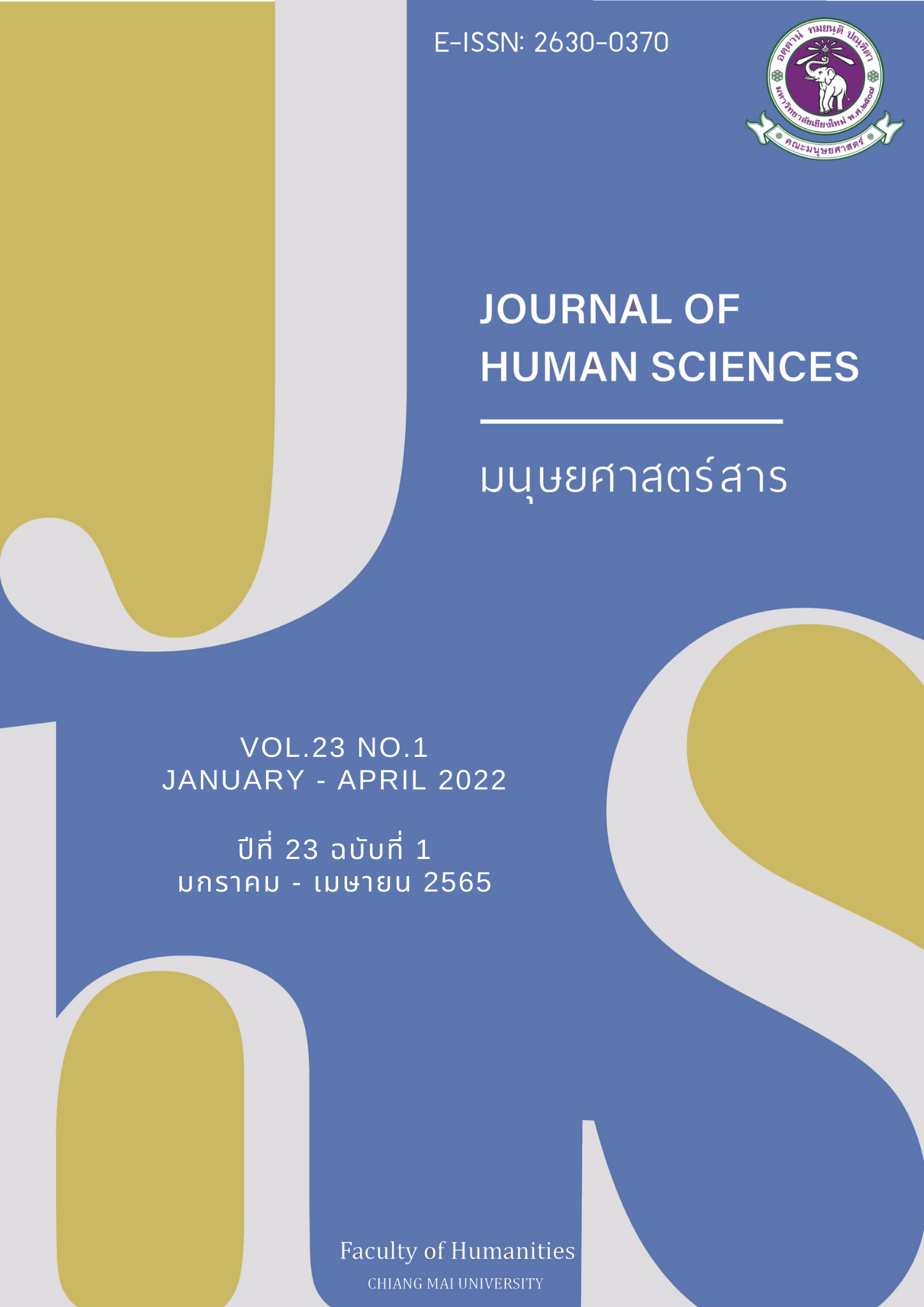กลวิธีการปรับแต่งการขอร้องของผู้พูดภาษาไทยชาวเกาหลีเปรียบเทียบกับผู้พูดชาวไทย
Main Article Content
บทคัดย่อ
งานวิจัยนี้มีวัตถุประสงค์เพื่อศึกษากลวิธีการปรับแต่งการขอร้องทั้งการปรับแต่งภายนอกและการปรับแต่งภายในการขอร้องของผู้พูดภาษาไทยชาวเกาหลีเปรียบเทียบกับผู้พูดชาวไทยโดยมีกลุ่มข้อมูลในการศึกษาสองกลุ่มคือผู้พูดชาวเกาหลีจำนวน 25 คนและผู้พูดชาวไทยจำนวน25 คน เครื่องมือในการเก็บข้อมูลคือแบบสอบถามชนิดเติมเต็มบทสนทนา (DCT) ผลการศึกษาแสดงให้เห็นว่าผู้พูดชาวเกาหลีใช้กลวิธีการปรับแต่งภายนอกส่วนหลักของการขอร้องทั้งหมด 17 กลวิธี ได้แก่ การให้เหตุผล (Grounder) การเรียก (Alerter) การขอโทษ (Apology) การปฏิสันถาร (Small talk) การสัญญา (Promise) การขอบคุณ (Gratitude) การตรวจสอบความเป็นไปได้ (Checking on availability) การชื่นชม (Sweetener) การใช้อวัจนภาษา (Paralinguistic cues) การร้องขอ (Plea) การวิงวอน (Appealer) การอวยพร (Blessing) การถามความคิดเห็น (Consultative device) การลดภาระ (Cost-minimizer)การใช้มูลบท (Presupposition) การใช้คำถามเชิงวาทศิลป์ (Rhetorical question) และการข่มขู่ (Threatening) ส่วนผู้พูดชาวไทยใช้กลวิธีการปรับแต่งภายนอกส่วนหลักของการขอร้องเพียง 13 กลวิธีโดยกลวิธีที่พบทั้งหมดเหมือนกับที่ปรากฏในข้อมูลของผู้พูดชาวเกาหลี ด้านกลวิธีการปรับแต่งภายในส่วนหลักของการขอร้อง พบว่าผู้พูดชาวเกาหลีใช้ 2 กลวิธี ได้แก่ กลวิธีการใช้คำลดปริมาณ (Understater) และ กลวิธีการใช้ประโยคเงื่อนไข (Conditional structure) ส่วนผู้พูดชาวไทยใช้ 4 กลวิธี ได้แก่ กลวิธีการใช้คำลดปริมาณ (Understater) กลวิธีการใช้ประโยคเงื่อนไข (Conditional structure) กลวิธีการใช้คำลดระดับ (Downtoner)และกลวิธีการถามความคิดเห็น (Consultative device) ผลการศึกษาครั้งนี้นอกจากจะแสดงให้เห็นกลวิธีการปรับแต่งที่เกิดขึ้นในวัจนกรรมการขอร้องของผู้พูดภาษาไทยชาวเกาหลีและผู้พูดชาวไทยแล้วยังแสดงให้เห็นลักษณะทางอันตรภาษาของผู้พูดชาวเกาหลีที่เรียนภาษาไทยเป็นภาษาที่สองหรือภาษาต่างประเทศอีกประการหนึ่งด้วย กล่าวได้ว่างานวิจัยนี้ได้ช่วยขยายขอบเขตการศึกษาด้านวัจนปฏิบัติศาสตร์อันตรภาษาในภาษาไทยและผลการศึกษาสามารถนำไปประยุกต์ใช้กับการเรียนการสอนภาษาไทยให้ชาวต่างประเทศได้อีกทางหนึ่ง
Article Details

อนุญาตภายใต้เงื่อนไข Creative Commons Attribution-NonCommercial-NoDerivatives 4.0 International License.
เอกสารอ้างอิง
ชาพิมญชุ์ บุญวิทยา. (2550). การศึกษาเปรียบเทียบต่างกลวิธีตอบรับการขอโทษในภาษาญี่ปุ่นและภาษาไทย. วิทยานิพนธ์อักษรศาสตรมหาบัณฑิต สาขาวิชาภาษาและวรรณคดีญี่ปุ่น, บัณฑิตวิทยาลัย จุฬาลงกรณ์มหาวิทยาลัย.
ประภัสสร เจียมวงษา. (2558). กลวิธีการขอร้องของชาวพม่าผู้พูดภาษาไทยเป็นภาษาที่สอง: การศึกษาตามแนววัจนปฏิบัติศาสตร์ระหว่างภาษาและวัจนปฏิบัติศาสตร์ระหว่างวัฒนธรรม. ปริญญานิพนธ์อักษรศาสตรบัณฑิต คณะอักษรศาสตร์ จุฬาลงกรณ์มหาวิทยาลัย.
ยางวอน ฮยอน. (2559). การศึกษากลวิธีแสดงความเห็นแย้งของนักศึกษาเกาหลีที่พูดภาษาไทยเป็นภาษาที่ 2 ในการสนทนาแบบแสดงความคิดเห็นในภาษาไทยตามแนววัจนปฏิบัติศาสตร์อันตรภาษา. วารสารภาษาและภาษาศาสตร์ 34(2), 1-19.
รดารัตน์ ศรีพันธ์วรสกุลและณัฐพร พานโพธิ์ทอง. (2563). การศึกษาวัจนกรรมการแสดงความเห็นแย้งของผู้เรียนภาษาไทยชาวจีนตามแนววัจนปฏิบัติศาสตร์อันตรภาษา: กรณีศึกษานักศึกษาชาวจีนจากมณฑลยูนนานและกวางสี. วารสารวจนะ 8(1), 1-26.
สำนักงานราชบัณฑิตยสภา. (2560). พจนานุกรมศัพท์ภาษาศาสตร์ (ภาษาศาสตร์ทั่วไป) ฉบับราชบัณฑิตยสภา. กรุงเทพฯ: บริษัท เอบิซ อินเตอร์กรุ๊ป จำกัด.
สุขใจ สัจจเทพ. (2555). การศึกษาความหลากหลายเชิงวัจนปฏิบัติศาสตร์: การตอบรับคำชมภาษาอังกฤษของผู้พูดชาวไทยและปัญจาบี. วิทยานิพนธ์ศิลปศาสตรดุษฎีบัณฑิต สาขาวิชาภาษาอังกฤษเป็นภาษานานาชาติ, บัณฑิตวิทยาลัย จุฬาลงกรณ์มหาวิทยาลัย.
สุจริตลักษณ์ ดีผดุง. (2544). สถานภาพการวิจัยภาษาศาสตร์ในประเทศไทย: ระบบหน่วยคำถึงระบบประโยคและความหมาย. วารสารภาษาและวัฒนธรรม 20(3), 21–41.
ฮามัม สุปรียาดี. (2548). การศึกษาลักษณะวัจนกรรมที่ปรากฏในเว็บโฆษณาไทย-อินโดนีเซียตามแนววัจนปฏิบัติ ศาสตร์. วิทยานิพนธ์ศิลปศาสตรมหาบัณฑิต สาขาภาษาศาสตร์, บัณฑิตวิทยาลัย มหาวิทยาลัยธรรมศาสตร์.
ภาษาอังกฤษ
Austin, J.L. (1975). How to do things with words (Second edition). Oxford: Oxford University
Press.
Boonkongsaen, N. (2013). Filipinos and Thais Saying “No” in English. Manusya: Journal of Humanities 16(1), 23–40.
Brown, P., & Levinson, S. (1987). Politeness: Some universals in language usage. Cambridge: Cambridge University Press.
Chen, R., He, L., & Hu, C. (2013). Chinese requests: In comparison to American and Japanese requests and with reference to the “East-West divide”. Journal of Pragmatics 55, 140–161.
Hymes, D.H. (1972). On Communicative Competence. In J.B. Pride and J. Holmes (Eds.), Sociolinguistics. Selected Readings (pp. 269-293). Harmondsworth: Penguin.
Kanchina, Y. (2019). Speech act of requests in Thai spoken by Chinese as a second language: a pragmatic study of interlanguage. Ph.D. Dissertation (Linguistics), Faculty of Graduate Studies, Mahidol University.
Kreutel, K. (2007). I’m not agree with you: ESL learners’ expressions of disagreement. TESL-EJ 11(3), 1-35.
Searle, J. R. (1969). Speech acts: An essay in the philosophy of language. Cambridge: Cambridge University Press.
--------------. (1976). A classification of illocutionary acts. Journal of Language in Society 5(1), 1–23.


